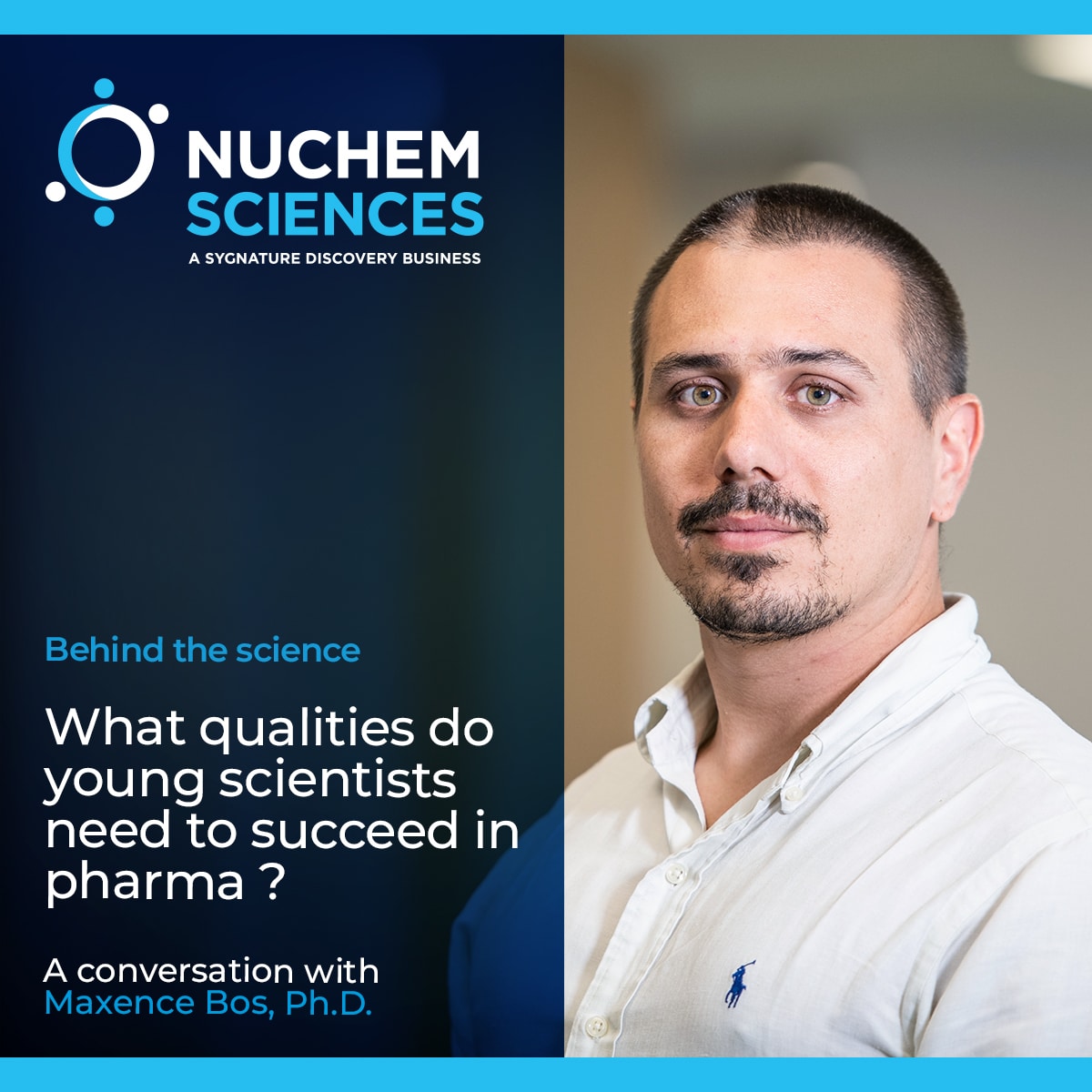What qualities do young scientists need to succeed in pharma?
A conversation with Maxence Bos, Ph.D.
At just 33 years old, Maxence Bos is the youngest person at NuChem Sciences to have reached a senior position in the company.
Born in France, he now leads a team of six as they solve complex chemistry problems for a wide range of clients across pharma.
Maxence tells us about what helped him grow his career, his desire to contribute to the scientific community and how rugby shaped his attitude to collaboration in the lab.

What is your background? What inspired you to go into chemistry?
I completed all my studies in France, right up to my Ph.D. in Reims. After my graduation, I had the opportunity to move to Canada for a post-doctoral fellowship at the University of Montreal.
After two years, I then had a choice – I could stay in Montreal or return to France. I was really happy here, so I decided to work with NuChem Sciences, and now it’s been almost four years!
Like many people who move here, once I came to Montreal, I didn’t want to leave. I miss my family in France, but there is something here that makes you feel good.
In particular, I felt that NuChem was the right choice for my career. I have great conversations with leadership here and feel trusted as an employee. When I first arrived, there were only 13 employees at NuChem. Now, there are more than 100.
NuChem provided me with an environment to grow as a chemist just out of academia. Now, I’m a chemistry lead overseeing a team of six people. It’s been an amazing experience from the start.
Do you see differences between the opportunities available in France and those in Montreal?
If you are talented and passionate about what you do, I think it’s easier to grow your career here. I’m only 33 and now have a position that I might never have had in France.
If I were in France, I might be asked to have at least 10 years’ experience before even being considered for a role – regardless of my skills or capabilities. For me, being in North America offers a better and faster progression in my career.
What does a typical day look like at NuChem Sciences?
On average, I spent around half my time at the bench doing chemistry and synthesizing molecules. The other part of my job is to coordinate the team’s efforts in order to meet our client’s expectations and to interact with our team of biologists as well as external contributors of the project.
Every compound is synthesized at NuChem Sciences, so I get to collaborate with the biology team, to ensure every compound we generate can be tested in a biology setting.
Is collaboration with other scientists important to you?
Absolutely! Every day at NuChem feels like a real research collaboration with scientists with many different areas of expertise. Just recently, we discovered a new process that wasn’t published in the literature, so we might share it in a publication.
At NuChem, we are contributing to our clients’ goals, but we’re also contributing to science. That’s what I like the most – sharing our findings with the scientific community and advancing our field.
What are your biggest professional achievements so far?
One of my proudest moments was when I was asked to assist another team that was struggling with some chemistry. I suggested an idea that led to an unprecedented reaction, which completely unlocked the potential of the project. It was an idea that had just come to me, and it ended up being workable and scalable. Now, the client is using it to produce this drug candidate on large scale. I actually met the client a year afterwards and they still remembered me!
As a CRO, clients expect us to find solutions rapidly and efficiently, and to move projects forward that others are struggling with. This is why clients want to work with us.
In this industry, we should also take pride in small, daily victories too. Every step we take could have a big impact on the project, especially in such a fast-paced work environment.
When you were looking for jobs in Montreal, what impressed you about NuChem Sciences?
From the first time I met the team here, I felt appreciated. Everyone – from junior chemists to upper management – came to see my first presentation. They introduced themselves, they were interested in what I presented, and they asked lots of questions.
This isn’t the case in every CRO. Leaders at other companies might not even introduce themselves to you after a presentation. At NuChem, the Chief Scientific Officer, Daniel Guay, took the time to speak with me. He saw my skills and knew I would be a good addition to the team – he knew I wouldn’t just fill a bench space! He also recognized that I would be able to take on bigger responsibilities in the future.
This openness I have with Daniel and the other leaders at NuChem is still going strong, and they continue to mentor me.
In other contexts, I might not have been given the opportunity to evolve or take on more responsibilities. After my interview, I was told that NuChem would not be afraid to promote young scientists to more challenging positions – so long as they demonstrated the right skills and a strong work ethic.
And it was true. I’ve reached this point in my career because NuChem gave me a chance to do my work well.
What value does NuChem Sciences bring the client?
When we work with a client, we are an integral part of their team. They also respect us as colleagues, not merely as providers. They place a lot of trust in our work and in the feedback that we give them.
Because of our great relationship, clients almost always come back to us with new projects, and often work with the same team. They are accustomed to working with us and everyone knows each other.
Right now, some clients are even asking when the Canadian border will be open again so that they can visit us in person and go for dinner! It’s a real friendship.
In your view, what has been the most interesting drug discovery to date?
I have deep respect for scientists like Copernicus, Louis Pasteur and Marie Curie, who took great steps forward for science. Today, we have so many techniques and tools to work with. That’s thanks to the people who were working with nothing and built the basis of science as we know it.
These people often took great risks to advance science too. They went against the accepted thought of the day, they were labelled heretics, but they ultimately laid the foundation for the science we do today.
What is your advice for a young person considering a career in chemistry?
Do what you love – something that you’re really passionate about.
The field I work in is one where you don’t count the hours until closing time. You do it because you love it, and you want to contribute to science.
Don’t choose this career purely for money. Don’t choose it if your parents are pushing you to. Do it because it makes you happy!
The importance of teamwork, on and off the pitch
A rugby player for 15 years, Maxence credits his passion for team spirit to his early days on the pitch.
“You can have individual skills and abilities that make you good at sport,” he says. “But, without the team, those skills mean nothing. In rugby and in life, you need a team around you.”
“Rugby also helped me grow in courage and gave me a determination to keep going and never give up,” he adds. “These values are also part of my daily work at NuChem, and they give me enormous happiness.”

Transformer les idées par la science
Société de recherche contractuelle dans la découverte de médicaments et en chimie des procédés.
Services offerts
Nouvelles
NuChem Sciences Inc.
2350 Rue Cohen Suite 201
Saint-Laurent, Québec
Canada H4R 2N6
514 416 5659
